Finding London
(This the eleventh in a series that begins with A Night in Steerage.)
London is my favorite city in the whole world but I ached on the way to the train station. I had loved not feeling (completely) like a tourist. Wendy, Sue and I had gotten on well together and I felt a lot of affection for them.
For these reasons the train ride to Paddington was dreary and sad. I cheered myself up by helping myself to everything I could off the tea trolley. And again at the lounge in Paddington where I had a cappuccino and tried to think what I should do first. I decided the first order of business would be to see if I could get into my hotel early. Since there were no public phones to be had, not even in the First Class Lounge, I sized up the room of folks waiting for trains and chose a couple to hit up for a local call on their cell phone.
Success! My room was ready.
When I handed the phone back to the couple, the woman asked, “Did I hear you say your name was Richmond?”
“Yes, that’s right.”
“That was my maiden name!”
There followed a genealogical conversation wherein we decided we must be related and I left the lounge smiling and thinking, “This trip feels charmed.”
My hotel was one of a village of hotels around Paddington station, cheap, clean and convenient to everything. I dumped my stuff , got myself an oyster card, and with the help of Pedro at reception, got on a 205 bus going along Marylebone (pronounced Mar le bun) Road to Baker St.
I was on the spy trail again. I wanted 64 Baker St, former S.O.E. headquarters. I knew that all I was looking for was one of those plaques. I had seen it dozens of times in documentaries but the point is I wanted to see it in situ.
“There it is!” I spotted it and crossed the street to stand under it and let my imagination loose.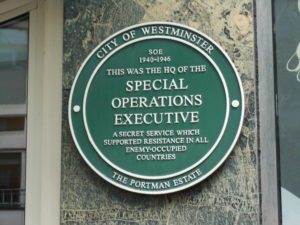
Just before Marylebone High Street turns into Marylebone Road was the Garden of Rest, a sweet, quiet little park. Charles Wesley is buried there.
When I came out of the park, an old woman with calm eyes said to me, “It’s a lovely park.”
“Yes, it is.”
“So many places to explore in London,” she looked at me as though she pegged me for the pilgrim I am.
“Do you know if Charles Wesley was the hymn writer or the preacher?” I asked.
“The hymn writer, I think,” she said. “I get them mixed up, too.”
And she was gone. (To all the things that will not notice when we die yet lend the passing moment words and wings.)
A notation on my map said there was a Dickens plaque on the corner of the two Marylebones. I was on the corner. I had to find it. I looked around.
“Oh god,” I thought. “I’ve got a blister on my toe and I don’t even know what I’m looking for. I’m never going to find this plaque.”
I was standing right under it. Charles Dickens wrote six of his novels in a house on that site.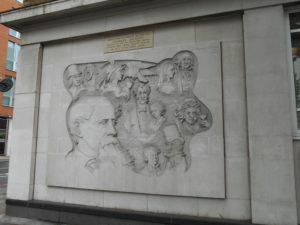 I tried to decipher the novels from the sculptures on the plaque but all I could think about was my toe. I went back to the hotel, put a blister band-aid on my toe, changed shoes, ate something from the mini-bar I had assembled from Wendy, Sue and the tea trolley on the train, rested up and was out the door in the opposite direction.
I tried to decipher the novels from the sculptures on the plaque but all I could think about was my toe. I went back to the hotel, put a blister band-aid on my toe, changed shoes, ate something from the mini-bar I had assembled from Wendy, Sue and the tea trolley on the train, rested up and was out the door in the opposite direction.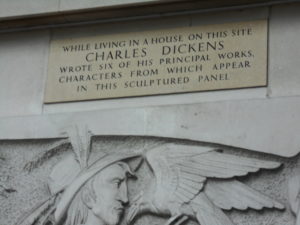
I walked the length of Kensington Gardens and Hyde Park from the Marlborough Gate to the laughably gaudy Albert Memorial and the venerable old Albert Hall and finally brought my dogs home for the night. I fell asleep during “Went the Day Well?”
The next morning I was up early and out with the commuters. I will remember for as long as memory serves that the 148 in London terminates at Camberwell Green. Every time the bus resumes after a stop, a voice says so. Since I saw and heard nothing to indicate the stop at which to disembark for the Imperial War Museum, I rode the 148 all the way it its terminus south of Elephant and Castle. It was hot and I had to pee as I waited for a bus back to town. When I disembarked from the ingoing bus, the driver made made sure I was facing the right direction toward the impressive edifice that is the Imperial War Museum, IWM London, and I spent the morning there. 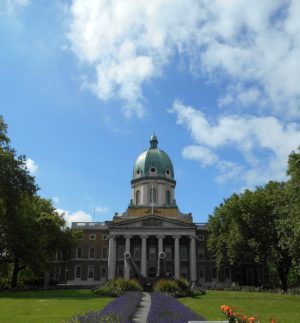
Again I headed for the S.O.E. exhibit and this is the last time it figured on my To Do list. There was way too much information to take in. Much of what I wanted was filed away in the education and research rooms and I didn’t have the energy to pursue it so all in all I think I enjoyed the little museum at Beaulieu better.
I wandered around Elephant and Castle, trying to figure out how to get to the next thing on my itinerary, the Globe Theatre. Without my earlier research I would be wandering there still. Eventually I ended up at Bankside, the area along the Thames just up from the Southwark Bridge. Let’s all say Southwark. Wrong. It’s pronounced “Su-thick.” What American would ever have guessed?
Hordes of schoolchildren swarmed the area, making it seem hotter and stickier than it was. I drank a lemonade practically in one swallow and bought a ticket for a tour of the Globe. When my tour started, Tony, the guide began collecting tickets:
“Thank you, lovely, thank you, cheers, thank you, brilliant, lovely, brilliant, cheers, thank you.”
I’m not sure but I think I stare when someone launches into a patter like that. And then I write it down.
There was a rehearsal going on for Macbeth that very afternoon, a piece of which we got to watch. It wasn’t the play per se but the jig that’s done at the end. I wouldn’t have thought a production of Macbeth would end with a jig but I learned that plays ended with a song or dance so everyone would know it was time to go home. There were no curtains to come down. The theater is open air, but is built so that in the event of rain, audience and players don’t get wet. The thatched roof hanging over the stage and stalls is the only thatched roof allowed in London. They don’t want a repeat of 1666.
After the tour I had to find the plaque that indicated the exact location of the theater. Found it. Breathed the air. Took the snap. I have a strong sense of the jolly old genius loci.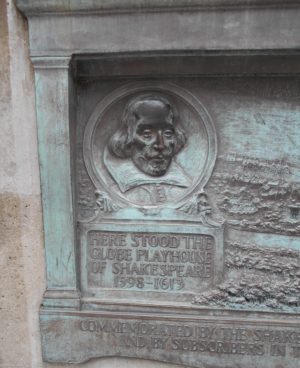
Then I had to figure out how to get back to Paddington. I had become good at working without a map. I looked for a double decker bus, any bus, and stepped on to ask what bus I wanted for wherever I was going. That usually got me started. Or I asked people on the street.
I hailed a man in a T-shirt that read “Something wicked this way comes.”
“Hallo, Macbeth person!”
He looked down at his t-shirt.
“Can you point me in the right direction for a bus to Paddington?”
See, this is the problem with always having used the subway. You get places faster but you have no idea about how the city connects to itself. There were any number of easy ways to get to Paddington but I didn’t know any of them at that point. Actually neither did the Macbeth person but he said if I caught an RV-1 two streets over, it would get me across the river.
“Are you an actor?” I asked.
“Yeah.”
“Your voice.” I indicated my throat. “You sound hoarse.”
“Yeah, I did some children’s performances over the weekend. Cheers!”
(To all the things we are not remember by, which we remember and bless.)
I caught up with a French couple who were waiting for the RV-1 and we rode together across Waterloo Bridge. She had a bus route—she got it in the subway, who would have guessed?—and helped me figure out which buses would get me to Paddington from Aldwych.
Before I started for home I went into The Delaunay, a restaurant and attached Konditorei. It was a beautiful and restful old place with classical music playing. I had a splendid (GF) raspberry poppy seed cake and an enormous pot of tea.
I remembered Chris of the Wookey Hole bus ride telling me about the coffee she had in the Conservative Club in Wells.
“I had a lovely coffee there. I’m not a conservative and you don’t have to be to go in. I always call there. I had a lovely coffee.”
I had been wondering what constituted a “lovely coffee.” Was it that the coffee was good or the cake or the atmosphere or all of the above? When I came out of the Delaunay, I thought, “I just had a lovely tea.” It also occurred to me that I always seem to find the England I am looking for even if it involves a certain amount of disassociation. The Delaunay might be a place for Austrian expats but I had a lovely tea there.
I was happy to be on the top of a double-decker, far from the madding crowds of Piccadilly Circus, Regents and Oxford Streets. At Paddington I popped into the subway and got a bus route map. That evening I fell asleep over a “Midsomer Murder.”
 RSS Feed
RSS Feed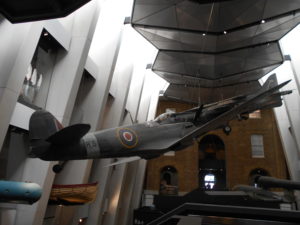
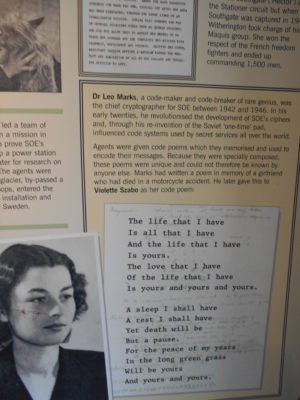
I love the idea of doing a jig to tell guests it is time to go home. I will remember this if I ever have any tedious guests!